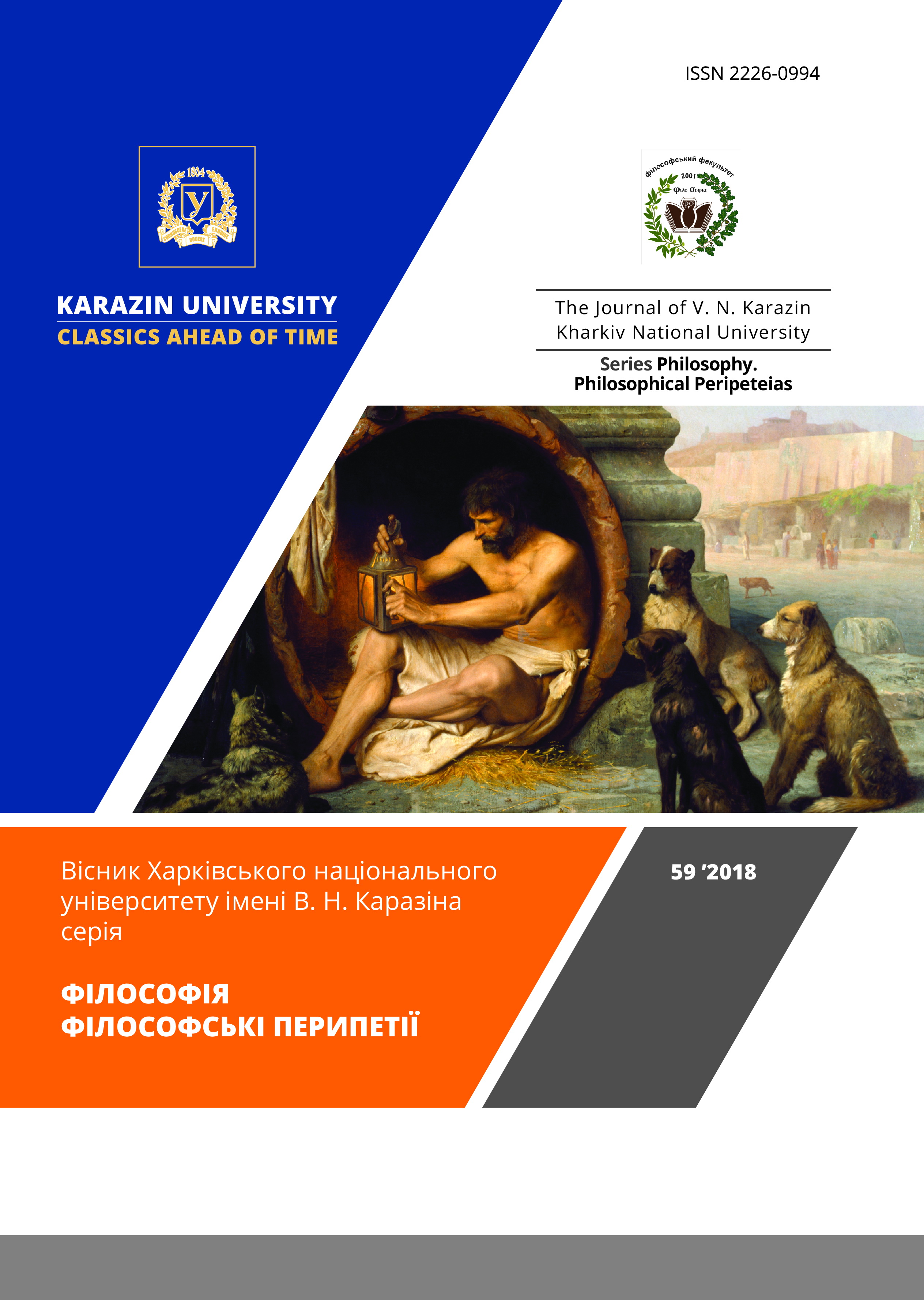ФІЛОСОФІЯ РУЙНУВАННЯ: «КАТЕХІЗИС РЕВОЛЮЦІОНЕРА» – ТЕКСТ-ВБИВЦЯ
Анотація
У статті проводиться філософський аналіз «Катехізису революціонера» у світлі його парадоксальності та нігілістичної граничності, котрі, виливаючись у систему практичних дій С. Г. Нечаєва, привели до вбивства студента Іванова. У зв’язку з цим актуальними стають виявлення філософського фундаменту «Катехізису революціонера», а також виявлення його природи у площині текстуальності та дієвості. Автор статті пропонує розглянути «Катехізис революціонера» як філософський текст на підставі наявності в ньому положень, що мають метафізичні та екзистенціальні аспекти. Водночас автор виділяє такі його ключові особливості: орієнтація на практику (відмова від теоретизування на користь дії «тут і зараз»), підміну цілі засобом її досягнення (заміщення цінності загального блага тотальним руйнуванням і парадоксальність боротьби за рівність шляхом формування жорсткої ієрархії), а також крайній етичний нігілізм і цинізм. Все це дозволяє позначити автору ідейний фундамент «Катехізису революціонера» як цілісну й послідовну філософію руйнування. Крім того зазначена філософія розглядається у контексті свого безпосереднього втілення, реалізованого С. Г. Нечаєвим: брехні, шантажу, компрометації, а головне – вбивства. Автор статті робить висновок, що неможливо досліджувати «Катехізис революціонера» у відриві від фактичних наслідків здійснення його філософії, а тому не можна говорити лише про його текстуальну природу, відсторонену від безпосереднього життя. Замість цього його слід розглядати як сплав текстуальності та дієвості, яка безпосередньо трансформує буття і впливає на життя людей. Таким чином, «Катехізис революціонера» представляється автором статті як текст-вбивця, що складається з філософії руйнування, з одного боку, і його втілення в дійсність – з іншого. Подібний підхід дозволяє не лише комплексно дослідити природу «Катехізису революціонера», але й визначити ряд небезпек, які містить у собі філософія руйнування.
Завантаження
Посилання
/Посилання
Bakunin, M. (1989). Letter to S. G. Nechayev. Retrieved from http://az.lib.ru/b/bakunin_m_a/text_0070.shtml. (In Russian).
Bakunin, M. (1842). Revolutionary catechism. Retrieved from http://knowledge1871.narod.ru/Anarhism/Bakunin/ReactionInGermany.htm. (In Russian).
Bakunin, M. (1866). The Reaction in Germany. Retrieved from http://ak-protest.narod.ru/revolytkatexiz.htm. (In Russian).
Berdyaev, N. (1918). Spirits of the Russian Revolution. Retrieved from http://www.vehi.net/berdyaev/duhi.html. (In Russian).
Camus, A. (2014). The Rebel. (E. Golovina, Trans.). Moscow: AST. (Original work published 1951). (In Russian).
Dostoevsky, F. M. (1993). Demons. Moscow: Sovremennik. (Original work published 1871–1872). (In Russian).
Grossman, L. (1963). Dostoevsky. Life of Great People: Series of Biographies (Vol. 24/357). Moscow: Molodaya gvardiya. (In Russian).
Karakozov, D. (1866). To Friends-Workers. Retrieved from http://historyussr.tumblr.com/post/159196245450/прокламация-друзьям-рабочим. (In Russian).
Lurie, F. (2001). Nechayev: Creator of Destruction. Life of Great People: Series of Biographies (Vol. 802). Moscow: Molodaya gvardiya. (In Russian).
Nechayev, S. (1869). Catechism of Revolutionary. Retrieved from http://www.hist.msu.ru/ER/Etext/nechaev.htm. (In Russian).
Pirumova, N. (1970). Bakunin M. Life of Great People: Series of Biographies (Vol. 1/477). Moscow: Molodaya gvardiya. Retrieved from http://oldcancer.narod.ru/anarchism/Bakunin/NMP1970-Cont.htm. (In Russian).
Zaichnevskiy, P. (1862). Young Russia. Retrieved from http://www.hist.msu.ru/ER/Etext/molrus.htm. (In Russian).
Бакунин М. Письмо к С. Г. Нечаеву [Электронный ресурс]. 1989. URL: http://az.lib.ru/b/bakunin_m_a/text_0070.shtml.
Бакунин М. Реакция в Германии [Электронный ресурс]. 1842. URL: http://knowledge1871.narod.ru/Anarhism/Bakunin/ReactionInGermany.htm.
Бакунин М. Революционный катехизис [Электронный ресурс]. 1866. URL: http://ak-protest.narod.ru/revolytkatexiz.htm.
Бердяев Н. Духи русской революции [Электронный ресурс]. 1918. URL: http://www.vehi.net/berdyaev/duhi.html.
Гроссман Л. Достоевский. Жизнь замечательных людей: серия биографий. Вып. 24 (357). М.: Молодая гвардия, 1963. 544 с.
Достоевский Ф. М. Бесы / авт. вст. ст. Б. Н. Тарасов. М.: Современник, 1993. 638 с.
Заичневский П. Молодая Россия [Электронный ресурс]. 1862. URL: http://www.hist.msu.ru/ER/Etext/molrus.htm.
Камю А. Бунтующий человек / пер. с фр. Е. Головиной. М.: АСТ, 2014. 511[1] c.
Каракозов Д. Друзьям-рабочим! [Электронный ресурс]. 1866. URL: http://historyussr.tumblr.com/post/159196245450/прокламация-друзьям-рабочим.
Лурье Ф. Нечаев: созидатель разрушения. Жизнь замечательных людей: серия биографий. Вып. 802. М.: Молодая гвардия, 2001. 434[14] с.
Нечаев С. Катехизис революционера [Электронный ресурс]. 1869. URL: http://www.hist.msu.ru/ER/Etext/nechaev.htm.
Пирумова Н. Бакунин М. Жизнь замечательных людей: серия биографий [Электронный ресурс]. Вып. 1 (477). М.: Молодая гвардия, 1970. 400 с. URL: http://oldcancer.narod.ru/anarchism/Bakunin/NMP1970-Cont.htm.
Автори, які публікуються у цьому журналі, погоджуються з наступними умовами:
- Автори залишають за собою право на авторство своєї роботи та передають журналу право першої публікації цієї роботи на умовах ліцензії Creative Commons Attribution License 4.0 International (CC BY 4.0), котра дозволяє іншим особам вільно розповсюджувати опубліковану роботу з обов'язковим посиланням на авторів оригінальної роботи та першу публікацію роботи у цьому журналі.
- Автори мають право укладати самостійні додаткові угоди щодо неексклюзивного розповсюдження роботи у тому вигляді, в якому вона була опублікована цим журналом (наприклад, розміщувати роботу в електронному сховищі установи або публікувати у складі монографії), за умови збереження посилання на першу публікацію роботи у цьому журналі.
- Політика журналу дозволяє і заохочує розміщення авторами в мережі Інтернет (наприклад, у сховищах установ або на особистих веб-сайтах) рукопису роботи, як до подання цього рукопису до редакції, так і під час його редакційного опрацювання, оскільки це сприяє виникненню продуктивної наукової дискусії та позитивно позначається на оперативності та динаміці цитування опублікованої роботи (див. The Effect of Open Access).






3.gif)




